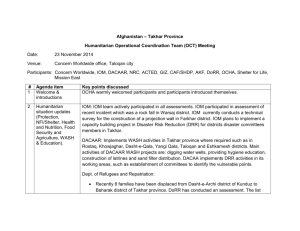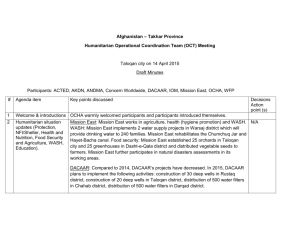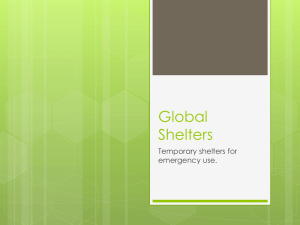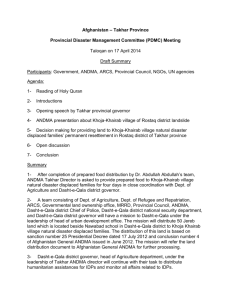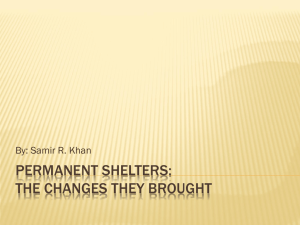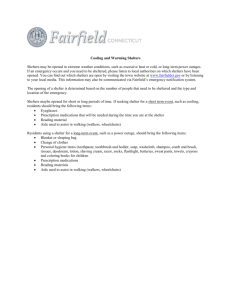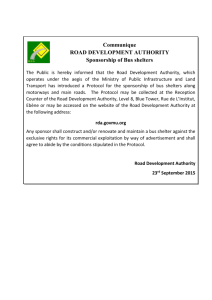141215_-_afghanistan_-_takhar_oct_meeting_
advertisement
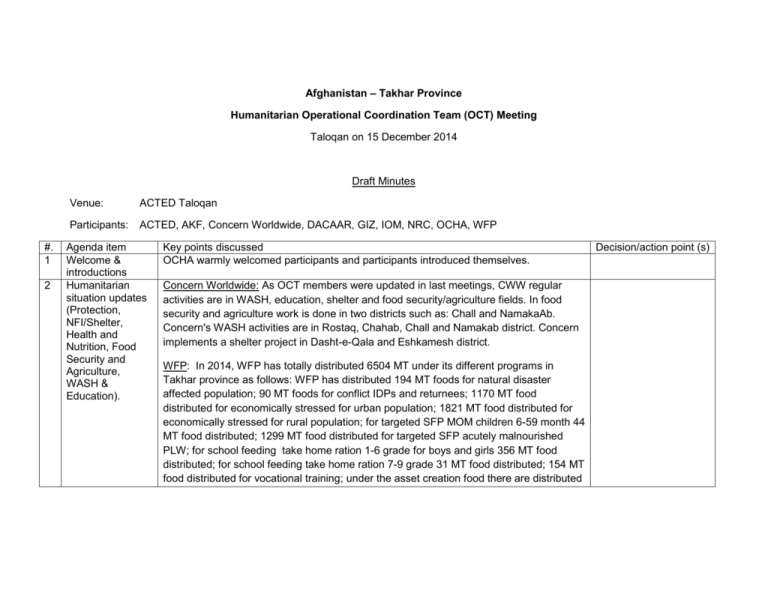
Afghanistan – Takhar Province Humanitarian Operational Coordination Team (OCT) Meeting Taloqan on 15 December 2014 Draft Minutes #. 1 2 Venue: ACTED Taloqan Participants: ACTED, AKF, Concern Worldwide, DACAAR, GIZ, IOM, NRC, OCHA, WFP Agenda item Welcome & introductions Humanitarian situation updates (Protection, NFI/Shelter, Health and Nutrition, Food Security and Agriculture, WASH & Education). Key points discussed OCHA warmly welcomed participants and participants introduced themselves. Concern Worldwide: As OCT members were updated in last meetings, CWW regular activities are in WASH, education, shelter and food security/agriculture fields. In food security and agriculture work is done in two districts such as: Chall and NamakaAb. Concern's WASH activities are in Rostaq, Chahab, Chall and Namakab district. Concern implements a shelter project in Dasht-e-Qala and Eshkamesh district. WFP: In 2014, WFP has totally distributed 6504 MT under its different programs in Takhar province as follows: WFP has distributed 194 MT foods for natural disaster affected population; 90 MT foods for conflict IDPs and returnees; 1170 MT food distributed for economically stressed for urban population; 1821 MT food distributed for economically stressed for rural population; for targeted SFP MOM children 6-59 month 44 MT food distributed; 1299 MT food distributed for targeted SFP acutely malnourished PLW; for school feeding take home ration 1-6 grade for boys and girls 356 MT food distributed; for school feeding take home ration 7-9 grade 31 MT food distributed; 154 MT food distributed for vocational training; under the asset creation food there are distributed Decision/action point (s) 1344 MT food. GIZ: GIZ regional coordination is supporting the interface-management between all GIZ programs in Takhar province, by arrangement of regular exchanges as well receiving the information and suggestion from GIZ programs on behalf of the GIZ RC Takhar and following up its implementation and feedback. GIZ programs: GIZ-RCDF( Regional Capacity Development Fund): School projects: Jaliar village of Bangi district, Khurmab village of Farkhar district. Protection wall in Shingrabi village of Bangi district (completed). Road rehabilitation for Mirha and Afghan Qishlaq villages of Bangi district (completed). Maternity unite in Bangi and Farkhar district emergency center(completed). Boundary wall project for Ghulam Sarwar high school in Baharak district (completed). Construction of 2 km side ditche of Bolalk Urta Buz road in Taloqan center (ongoing). Construction of Women Training Center (WTC) in Aikhanuma park, Taloqan city (ongoing). IOM: IOM team actively participated in all assessments, IOM conducted a technical survey for construction of a projection wall in Farkhar district, the survey result was sent to Kabul, probably the protection walls will be constructed, IOM has 860 NFI kits available in its Takhar stock and is in the process of purchasing NFI materials in Kabul. DACAAR: DACAAR projects are about to end in Takhar provincial level for 2014, the 2015 projects plan was sent to its Kabul office and is under review. ACTED: Cash for fuel project which is funded by CHF. Through this project ACTED will distribute fuel cost for cat. A families who have been identified by humanitarian team in Takhar province and have not received shelter. OCHA has updated the team by recent finding of OCHA, ACTED and ANDMA meeting. Totally there have been identified 414 families of Cat. A who didn’t / don’t receive shelters who are the cash for fuel project beneficiaries in Takhar province. The details are as follows: 1. Taloqan city – 222 families; 2. Eshkamesh district – 47 families; 3. Darqad district – 81 families; 4. Kalafgan district – 28 families; 5. Farkhar district – 11 families; 7. Chal district – 19 families; 8. Chaab district – 6 families. Total – 414 families. AKDN: Actively participates in joint assessments in Taloqan city and its working areas. Provides hygiene education in 5 districts of Takhar province, 40 villages in each districts such as Warsaj, Baharak, Dasht-e-Qala, Rostaq and Kalafgan. 3 4 Shelter construction projects updates by NRC and Concern Worldwide. IDP policy Concern Worldwide: CWW constructs 165 shelters for Eshkamesh district flood affected families and 127 shelters for Khawja-Khairab landslide affected families in Dash-e-Qala district of Takhar province. The shelter constructions are about completion and will be handed over to beneficiaries in the comings weeks. The WASH gaps have been addressed by DACAAR and CWW, but the IDP families do not have full access to health and education facilities. According to OCT team distance from IDP camps to health clinics and schools are more than five km. NRC: NRC has constructed 48 shelters for returnees. The shelters were handed over to beneficiaries. NRC is constructing a total of 60 shelters for Taloqan city flood affected families: 27 shelters in Ahangaran village, 4 shelters in Mughulha village, 5 shelters in Kalafganiha village, 11 shelters in Baba Zarif village, and 13 shelters in Poli Qaq village of Taloqan city. The beneficiaries received disaster risk reduction and hygiene training, latrines were constructed and about 50 families have been accommodated in their shelters. OCHA updated on the National IDP policy task force’s work, conveyed the key message on policy implementation at the national level and 2014 implementation at the provincial level and plans for 2015. The update IDP policy is attached. Key points: Funding IDP is integrated into the annual budget of the line ministers+ individual UN/NGO of budget contributions. Ensuring an all of government to IDP and aligning UN and civil society response with governmental response. Development of the provincial action plans is area based not group based and is keeping with the governmental budget item in line. Policy covers the entire range of displacement so requires enjoyment of both humanitarian and development sectors. Delimitation of the policy will enable a common understanding and language around IDPs. Issues of Refugee Returnees are similar to IDPs. Follow up on the gap with related clusters: IDPs do not have full access to health and education in Dash-eQala and Eshkamesh district. The IDP policy was already shared with humanitarian partners. Once again, OCHA will circulate the updated policy together with OCT minutes.
